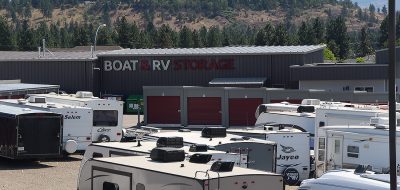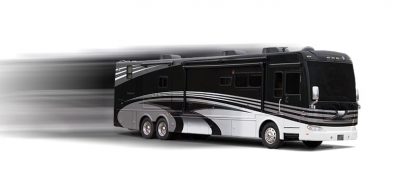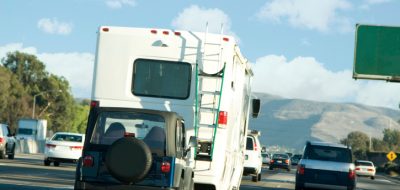On March 16th. I did a write up covering some of the choices of supplement braking systems on today’s motor coaches, like Pac and Jake brakes. I also did a piece the following week, on March 23rd, on real world application and techniques of same. Well, this week’s topic will relate to those as we look at better braking systems for air equipped coaches.
Until only recently, air disc brakes were unheard of on motor homes. Now, a number of higher end coaches are coming equipped with these as standard equipment. Will this number increase in future? Yes. Disc brakes on Class 7 and 8 vehicles will increase in popularity greatly in the future. Shorter stopping distances are being mandated by the government on trucks that share the same weight characteristics as do many diesel pusher, “A” class coaches. The NHTSA/DOT wants to reduce heavy truck stopping distance by 30% with a target date some time in 2010.
Heavy trucks in Europe equipped with air disc brakes account for 76% of the total. North America scores about 5% only that are so equipped with the first one released in 1988. The first coach type vehicle to use all air discs was MCI in 1994. Today most of the heavy motor coaches are equipped with air discs, either all or at least front. While there are few class 7 ( 26,500/33,000 lbs. or so) sized coaches employing air discs, it would appear that is all about to change in the very near future.
Are they that much better than the “S” cam drum type? According to many actual field tests they appear to be far superior in the following ways.
Better Stability and Resistance To Brake Fade:
Excellent hot brake performance with less than 4% fade and superior cooling. Far better stability with 10% or less torque difference as compared to drum at around 30%.
Shorter Stopping Distance:
Stopping distances were reduced 30 to 37% when compared to their drum type predecessor.
Longer Life and Reduced Maintenance.
Bendix conducted tests using identical vehicles, one with “S” cam drum brakes and the other with air discs. These tests produced a result showing that the air disc out lasted the life of the drum type brake linings by 87%. Lining replacement may not be required until 500,000, 750,000 or even 1,000,000 miles. Additionally, servicing is reduced when compared to that of conventional drum type foundation brakes.
Increased Stability and Superiority at Higher Speed.
Braking balance and stopping distance difference increases as speed increases.
Driving a heavy vehicle equipped with these air disc brakes yields a noticeable feel as they react to less air pressure requiring less effort on the operator’s part. They also may feel smoother with less steering axle pull tendency. Unlike the automobile hydraulic calipers, the air powered disc brakes are capable of being used in a park brake mode. These use a standard or similar additional brake chamber that contains a heavy spring. They engage the same as drum type Maxi with air off.
The cost in North America of these air powered disc brakes is about 1 ½ times that of conventional drum type. This is in contrast to Europe where they can actually produce them cheaper than the heavy drum type. But, even at an increased cost, I think this newer generation of improved braking system design will benefit all, and may be very well worth the price.
Them’s The Brakes – Lug_Nut – Peter Mercer







Pingback: my url
Classic Disc Brake Kits
Interesting post. Air disc brakes are superior!
BWade
Riggarob,
try asking your insurance company. Their actuaries have to keep up with that in order to set premiums. A few years ago I asked why the Annual premium was higher on my wife’s SUV ($30k) than our RV ($120k). She said the claims and accident statistics were much better on RV’s than SUV’s. I did not ask about specifics.
Lou
Several states do require a CDL class B non commerical license to drive anythong over 26,000 lbs or with air brakes.
Pa is one of those states where it is required and in getting mine I learned several things which helped me drive my 40 foot diesel in a much safer manner
Motorhome Magazine published a state by state list and the requirements, which is where I found out I needed the CDL
John
riggarob,
I been trying to get the statistics on the accidents rates for each category of vehicle. Unfortunately, the police do not compile seperate statistics making it virtually impossible to see what the ratio is.
You may want to check the RV Consumer group at http://www.rv.org/index.html for some info.
The RV manufacturers may keep statistics also, but my guess is they wouldn’t want to share that information with the public.
Good luck in finding more.
riggarob
Does anyone have HARD FACTS about the % of Rv accidents vise automotive accidents? You know, how many miles auto verses RV, and accidents resuting. I’m guessing that RV incidents are WAY DOWN, opposed to the rest of the motoring public. JM2C
Lug_Nut
Great comments John. In Ontario, Canada, where I’m from, the same laws regarding an air endorsement apply. Written test and practical required and then written again every renewal (3 years)
Again, thanks for your comments.
John
Regarding Mac’s comment on driver testing:
As a retired Teamster I would have to agree that there should be some kind of scrutiny to verify the operators ability. Lets face it, we love to travel the road as RVérs, but for safety sake we have to be able to safely operate and that includes backing into a campsite.
In British Columbia if a vehicle is equiped with air brakes, the operator must have an air endorsement certificate which is obtained by taking a course and writing an exam and performing a hands on practical exam (adjusting and checking the brake system). There are different levels for various class of vehicles such as on-road and off-road trucks that require fresh water to assist in cooling rakes on steep logging roads etc.
In closing, common sense must prevail when it comes to braking. I have seen too many vehicles (trucks, RV’s and cars) that did give the respect that mountainous terrain demands. Some of these ended up bogged down in the runaway lanes that are seen part way down some steep gardes.
When I go shopping for a new diesel pusher, I’d like to try out the new disc brake systems mentioned in the above article. Although I’ve had good service life from drum brakes on equipment I’ve operated over the years.
Keep it safe and cool…………
Michael
Mac has a good point. About all most new owners of “big rig” RVs, be it MH or fiver, is whatever the salesperson gives them.
Fortunately, most RVers keep within their skills as an operator. Like my good friend who never, ever backs his 40 ft. DP into a campsite. He has his wife do that. ;-]
David
Testing out a new Gravatar feature of the rv.net blog site. YOu should see a pic of me in this post. Get your own by going to http://www.gravatar.com.
Lug_Nut
Mac, Actually in many provinces and states you do require both higher license levels and air endorsements. This number is increasing as new regulations are made.
McGreevy
Well, I think it’s something that should happened a long time ago.
That said, I have a question. How come to drive for a living one must pass a test to drive anything over 26000# or anything that has a air brake.
But, if you drive a Motor Home/RV you don’t need any testing.
I wonder….maybe when someone get’s in an RV..IT MAGIC.
jus my 2 cents
Mac
Mark Skotek
I have seen disc brakes on large trucks and operators who used them converted to drum brakes because in heavy duty use the brake lining only lasted a week. the draw back is they heat up quickely and then ruin the rotors. Ive seen “Waste Management” mechanics converting disc back to drum which involved much time and labor. Buying lining and rotors every week was not cost effective.
Peter
Interesting timely progression. Life has too many confusing choices, without enough info!! DP or TH’s,
Golf anyone, or groundhogs and go fish. The journey’s a gas and hopefully everyones now laughing at co-operation. Great article.
Like you’re preceeding were!! Peter